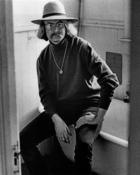
Richard Gary Brautigan was born in Tacoma, United States, on January 30, 1935. His father never recognized him and, when he was nine, his mother abandoned him and his sister in a hotel room in Great Falls, Montana. They spent many hours waiting for me to return, until the establishment's chef decided to welcome them. Someone has said that his brain was the only toy he had. At twenty he was held in a hospital for the mentally ill for throwing a stone at a police station. He had done so to get arrested and fed him, but in the hospital they ended up diagnosing him paranoia, schizophrenia and depression. In his own words, there he received "enough electroshocks to illuminate a town." In that same hospital it would be filmed later. Someone flew over the cuckoo's nest.
He decided to leave for San Francisco and devote himself to writing poetry. He completed ten novels, nine poems and numerous stories, which for some were among the best of his time. At the beginning, however, it was difficult to publish. (The Richard Brautigan Library honors his memory in Vermont. In the 1990s, it accepted manuscripts rejected by publishers as long as the authors paid for the binding. The idea was taken from his novel The Abortion, which largely takes place in a library of unpublished works.) In 1964 A Confederate General from Big Sur was published. It was a clamorous failure. In the fall of 1966, Brautigan had fun with the idea of being a cult author in Berkeley, where the book worked well in the balance section of an iconic bookstore. Despite the failures and setbacks, he persevered with his manuscripts. And finally it reached: in 1967 The trout fishing in America is published, instant critical and public success. He had written the book in 1961, during a camping trip he took in the company of his wife and daughter, and in which he carried a typewriter and a folding table. It was, therefore, his first novel, although it was the second to be published.
With her he obtained great international fame and, of course, he paid the ground for his fall. Brautigan traveled a lot, bought property, gave himself the life he had not had until then. But he did not know how to carry the weight of fame well. Drunkenness, the seduction of his unconditional followers and women, suddenly so available (posed with some of them for the covers of his books, and made his phone number included in some of the editions), they charged a price tall.
Although certain writers applauded the success of the ugly duckling turned into a star and the media placed him in the firmament of the counterculture next to Dylan, Ginsberg or Timothy Leary, critics negatively valued his later books, and due to his increasingly literary writing , his readers began to stop reading it. The sixties gave way to the seventies. Jerry Rubin arrived on Wall Street, Abbie Hoffman became a fugitive, many of the flower power boys went into yuppism and Brautigan sank into the decline, becoming the sad symbol of a troubled time. And past. The condescending vision makes him a victim of counterculture.
For others, however, he was simply a hero. From the point of view of writing, there are those who continue to consider it unclassifiable. The United States had already forgotten it when, on October 24, 1984, its body was covered with worms. Several weeks before, it is not known exactly when, he had shot himself. Next to his body, the gun and a bottle of liquor.
Paradoxically, readers around the world who continue to discover it are legion. No need to continue writing, although remembering it, reading it, you miss so much. Only that, in Vonnegut's words, “as has happened with so many other good writers, he could finally with him that chemical imbalance that we call depression, and that he fulfills his mortal work regardless of what is happening in the love life of the sufferer , regardless of their adventures, good or bad, in the Heartless Market ».




